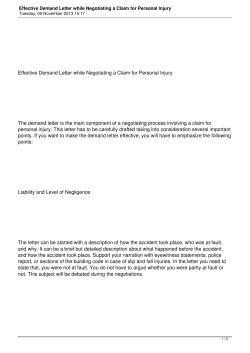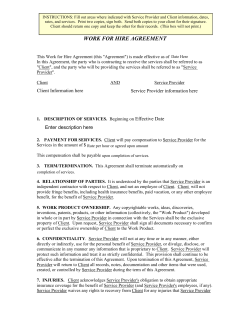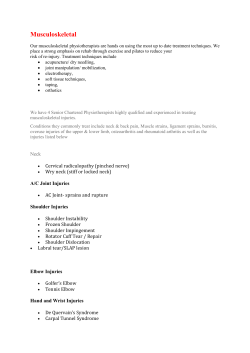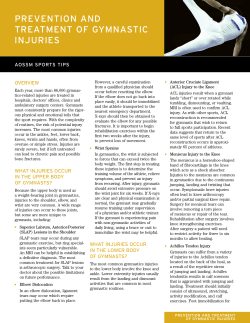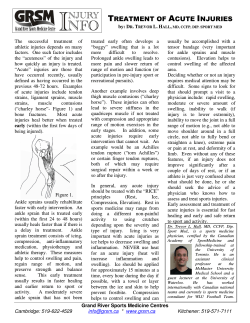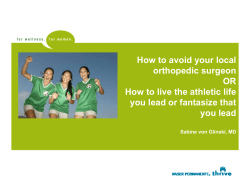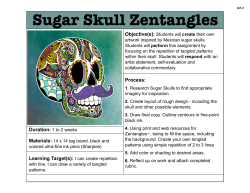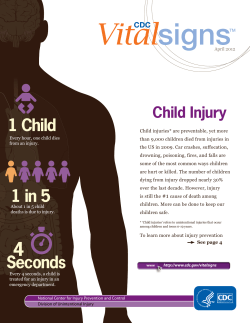
Head injury A guide for patients and carers
Head injury A guide for patients and carers The Brain and Spine Foundation provides support and information on all aspects of neurological conditions. Our publications are designed as guides for people affected by brain and spine conditions - patients, their families and carers. We aim to reduce uncertainty and anxiety by providing clear, concise, accurate and helpful information, and by answering commonly asked questions. Any medical information is evidence-based and accounts for current best practice guidelines and standards of care. Contents Introduction 1 Common questions 2 Tests and investigations 3 Minor head injuries 5 Moderate to severe head injuries 9 For friends and family 24 Health professionals 26 Useful contacts 27 Further reading 30 References 31 Thank you 32 Introduction This booklet provides information on head injury and concussion in adults. It provides information on the different levels of head injury and is divided into sections on minor head injuries and moderate to severe injuries. It also provides information on tests and investigations, possible treatments, recovery, rehabilitation and returning to everyday activities. Sources of further support and information are listed in the Useful Contacts section on page 27. References are available on request. We have divided this booklet into sections on minor head injury (page 5) and moderate to severe head injury (page 9) as symptoms, possible treatments and recovery time will vary depending on the severity of the injury. 1 Common questions What is head injury? A head injury is a blow to the head from a force outside the body, like an accident, fall or attack. When the brain is damaged by such an event, this is called a traumatic brain injury (TBI). What are the symptoms? The symptoms and effects of head injury can vary widely, depending on the level of injury and which part of the brain, if any, is injured. They can range from a bump or bruise on the head to loss of consciousness. What are the different types of head injury? You may hear nurses and doctors using certain terms to describe a head injury: • Closed – when the brain has been affected by a strong force, like a blow to the head after a fall or a car accident, but without fracturing the skull • Penetrating – when something pierces the skull, for example a brick or a bullet • Crushing – when the head has been squeezed How serious is it? Doctors use a grading system called the Glasgow Coma Scale which classes head injuries as Minor, Moderate or Severe, based on how well someone responds to sensations and instructions, the responsiveness of their eyes, and how well they can speak. 2 Tests and investigations Assessing the severity of the injury A nurse or doctor will carry out a series of simple tests to check your level of consciousness and how alert you are. These include asking questions, asking you to follow instructions and checking your reflexes. The tests are assessed using a rating system called the Glasgow Coma Scale. Glasgow Coma Scale Score 13-15 9-12 Degree of injury Minor Moderate Person remains alert, can answer questions and move the body in response to instructions. Might include loss of consciousness (passing out) but only for a short period. Confusion, difficulty with speaking clearly or following instructions. Loss of consciousness for a longer period. 8 or lower Severe Low or no response, little control over speech or movement. Prolonged loss of consciousness. The doctor will also check your eyes, limbs and movement. They will ask questions about how the accident happened, to build up a complete picture. 3 Tests and investigations Observation In the A&E department, staff will make regular checks, including: • Level of alertness (being awake, talking) • Size of pupils (the dark circle in the centre of the eye, which reacts to light) • Limb movements • Breathing rate • Pulse • Blood pressure • Temperature • Oxygen level in the blood If there are any changes that suggest your condition is getting worse, a doctor will reassess your condition. Sometimes with a minor head injury, the doctor recommends staying in hospital briefly for these observations. CT scan If the brain is thought to be injured, the doctor will order a CT (computerised tomography) scan. This is a special type of X-ray which takes pictures of the brain from different angles and can show the location of the injury. During the test you will be asked to lie on a scanner table while the scanner rotates around your head. It is a quick and painless examination. 4 Minor head injuries Introduction A minor head injury is one where the person remains alert and can answer questions and move the body in response to instructions. It might include a loss of consciousness (passing out) but only for a short period. This section has information on possible treatments, going home, recovery and resuming everyday activities if you have had a minor head injury. For information on moderate to severe head injuries, see page 9. Possible treatments Pain relief medication Headache from a minor head injury can last from a few weeks to several months (although it may clear up sooner). Over-the-counter medication usually gives enough pain relief. The doctor or nurse will tell you what medication to take, how often and for how long. You should avoid any medicines not prescribed by your doctor until you are feeling better or have seen your GP. Rest It is important to rest following your head injury. Many people feel very tired and need to sleep a lot at first – this is normal. You should not return to your normal activities until you start to feel better. If you have children or are caring for someone, you will need help with these responsibilities for a few days. 5 Minor head injuries Going home After a minor head injury, once your observations have been normal for a while, you can go home. However, it is important to follow some safety guidelines, considering whether you: • Will be alone at home • Are under the influence of alcohol or drugs • Have other injuries that need treatment If your injury has been caused by an assault and you feel worried about your safety when you leave hospital, staff can help you make contact with the police, an emergency social worker and Victim Support. You might get a card to take home with details of what to do if your symptoms get worse, and signs to look out for. The hospital will also give you a letter to give to your GP. You might be advised to make a follow-up appointment with your GP or the hospital’s minor head injuries clinic. When you go home from hospital, you need to have access to a phone, and you must be able to reach medical help quickly if you need it. For safety, someone should stay with you for the first 48 hours. 6 Recovery Many people have symptoms for the first week or so after a minor head injury. These can include: • Feeling dizzy • Feeling very tired • Vision problems • Being sensitive to light and noise • Insomnia (can’t sleep) • Problems with memory, concentration and thinking • Irritability • Anxiety These should improve over time and will almost always go away within a few months. Until the symptoms improve, it is important to get enough rest while gradually returning to your usual routines. Try to take it steady, rather than swinging between too much activity and too little. You can also take simple steps to make life easier initially: • Stick to a daily routine • Keep calendars, checklists and notebooks to help remind you of your schedule • Focus on one thing at a time and keep distractions and noise to a minimum • Have small breaks throughout the day • Allow extra time for journeys or tasks 7 Minor head injuries Be realistic about giving yourself time to recover. Plan a fairly light schedule of activities at first, with low-stress, routine tasks. For a while, it may be helpful to reduce activities that put you under pressure, for example things that require intense concentration or quick decisions. You could try spending a little more time on these tasks each day, rather than attempting something big all in one go. Try to take small steps towards getting back to your regular routine. If you are returning to work, pace yourself slowly at first, then gradually build up as your stamina and confidence improve. Sometimes it may be better to work shorter hours initially. These steps may be especially important if you have a stressful job. You should: • Avoid sport for at least three weeks and ask a doctor before resuming • Avoid driving until you feel well enough • Avoid drinking alcohol for a week or two following your injury A small number of people may have ongoing problems after three months. If your symptoms are not clearing up, see your GP or talk to the staff at the minor head injury clinic. 8 Moderate to severe head injuries This section has information on moderate to severe head injuries, focusing on care and treatment in the immediate period following the injury. It includes information on the possible effects of a moderate to severe head injury, possible treatments, going home, recovery and rehabilitation. For information on minor head injuries, see page 5. What is a moderate to severe head injury? A moderate head injury is one where the person displays confusion and difficulty with speaking clearly or following instructions. It may include loss of consciousness. A severe head injury is one where the person has low or no response to stimulus and little control over speech or movement. It may include prolonged loss of consciousness or coma. Coma When someone is in a coma, they are deeply unconscious and cannot be woken up. They do not speak or respond to voices, or even pain. They might not be able to breathe without help from a machine. Most people come out of a coma after two to four weeks, but a few people remain unresponsive, or have limited consciousness, for many years. When someone comes out of a coma, it is usually gradual, with small improvements over time. Unfortunately, some people who go into a coma may never regain consciousness. 9 Moderate to severe head injuries Possible effects The effects of a moderate to severe head injury will vary from person to person, depending on which, if any, parts of the brain are affected. It will also depend on the extent of the injury. Not everyone will experience all of these effects. Concussion A concussion happens when the brain is ‘shaken’ inside the skull by strong forces and/or a blow. It might be followed by confusion or loss of consciousness. Where concussion has occurred, doctors will usually classify the injury as “moderate”. Fractured skull A fractured skull is a serious injury. The rough edges of broken bone can damage the lining around the brain or cause bleeding. Sometimes a fracture in one area causes other parts of the skull to slip out of place. If a patient’s skull is fractured, they will stay in hospital for observation, in case they need prompt surgery. Internal bleeding (brain haemorrhage) Bleeding inside the head is a very serious situation. The bleeding will put pressure on the brain and if the pressure gets too high the brain may be damaged. A neurosurgeon will decide what treatment is required and whether the patient needs to be transferred to a neurosurgical unit. 10 Possible treatments Treatment options for a moderate to severe head injury depend very much on the individual and their situation. Factors to consider include: • How severe the head injury is • The nature of the injury • Which part of the brain is affected • Whether there is bleeding in the brain • Other injuries that might be present Treating serious head injuries needs expert skills A neuro-trauma centre is and advanced equipment, a hospital that specialises so some hospitals specialise in this kind of in treating serious brain care. If the person with a and spine injuries. head injury is not already in one of these hospitals, their scans can be sent by computer for the specialist doctors to look at. They might advise remaining at the current hospital in a neurosurgical ward or intensive care, or they might recommend an urgent transfer to the neuro-trauma centre for treatment. Ventilator (breathing machine) A ventilator (breathing machine) is a machine that delivers the right amount of oxygen, at the right rate, to the person with a head injury. A tube runs from the machine, down the person’s windpipe and into the lungs. When someone is on a ventilator, they are always sedated to make them more comfortable. 11 Moderate to severe head injuries There are various reasons for being on a ventilator. A person might be on a ventilator because they are deeply unconscious and unable to breathe on their own. Sometimes when the brain is swollen, people can become agitated or aggressive and may hurt themselves, so they may be sedated and put on the ventilator to enable them to rest safely. If the head injury is very serious, the person might be deeply sedated and put on a ventilator so that the brain can be protected and allowed to heal. This is called an induced coma. Later on, the sedation drugs can be decreased until the person wakes up. Medication Various drugs can be used to help the injured person feel more comfortable and to try and prevent complications. These medicines might include: • Sedatives, which keep the brain and body deeply relaxed • Painkillers • Anti-epilepsy drugs (AEDs) to prevent seizures • Blood thinners to prevent blood clots • Steroids or diuretics to reduce swelling around the brain Intracranial pressure monitoring If the head injury has caused bleeding or swelling inside the skull, the delicate tissues of the brain could be damaged. To make sure this can be spotted quickly, a small device called an intracranial pressure monitor (ICP monitor) might be fitted. 12 To fit the ICP monitor, the doctor drills a small hole in the skull, about the size of a five pence coin. A thin wire is inserted through the hole, and rests in the space between the skull and the brain. The wire is attached to an electronic pressure monitor. If the pressure goes up, the staff will be alerted and take measures to reduce it, to lessen the risk of further brain injury. Surgery Only about three in 100 people with a head injury will need surgery. But sometimes it is the only way to repair the damage, or prevent more complications. Some reasons for surgery include: • Removing blood clots that have formed • Repairing a skull fracture (although they often heal on their own) • Removing debris or fragments of bone • Inserting a temporary drain if there is bleeding or a build-up of fluids • Repairing a hole in the lining around the brain, which is allowing cerebrospinal fluid to leak out One of the commonly used procedures is called a craniotomy. A craniotomy is an operation to open the head in order to expose the brain. The word craniotomy means making a hole (-otomy) in the skull (cranium). During the operation an incision (cut) is made in the scalp, a skin flap is peeled back, burr holes are drilled in the skull, and then a piece of bone (“bone flap”) is cut out like a trap-door to reveal the brain underneath. After the operation the bone flap is replaced and the scalp is stitched together. The bone flap is usually fixed into place with small metal screws to prevent movement and encourage better healing. 13 Moderate to severe head injuries You might be interested in reading our fact sheet on Craniotomy for more information. This can be downloaded from our website, see page 27 for more details. Recovery Recovery from a head injury will depend on the individual situation. Recovery is not always a straight path forward. There may be setbacks or detours, and unfortunately, some people who have sustained a severe head injury will not recover. In general, the more serious the injury is, and the more complications there have been, the slower recovery might be in the long term. Long term physical effects There may be long term physical effects including: • Weakness or loss of the use of a limb • Lack of co-ordination • Fatigue • Dizziness • Problems with balance • Headaches • Loss of taste or smell • Problems with vision or hearing • An imbalance in hormone levels • Some people go on to develop epilepsy (seizures or ‘fits’) These may get better over time, or they may be lifelong. 14 Hormone levels The hypothalamus and the pituitary gland are the parts of the brain responsible for regulating hormones in the body. A head injury causing damage to either or both of these structures may result in an imbalance in hormone levels, with either too little or too much of one or more hormones being released. Symptoms of a hormone imbalance may include depression, sexual difficulties and fatigue. If you experience these symptoms after the first few months following your head injury and think you may be affected, you could ask your GP for a blood test. Long term psychological effects Long term effects may also be psychological and include problems with: • Thinking skills • Concentration • Memory • Making plans or getting started on things • Moodiness and irritability • Disinhibition (losing the sense of control that would normally make someone think twice about their behaviour) To family and friends it may seem as if the person’s personality has changed since the injury. They may lose their temper more easily or seem uninterested in things they used to enjoy. Again, these effects may get better over time or they may be lifelong. 15 Moderate to severe head injuries Memory You may experience memory and concentration problems following a head injury. You might find it difficult to concentrate for long periods of time and this might make even simple tasks like reading a book or making a cup of tea difficult and frustrating. Try to break tasks down into small steps so you only have to concentrate for short periods of time before taking a rest. After a head injury, certain parts of your memory might be affected. You might not remember very much about the injury itself or what happened when you were admitted to hospital. You might find that you can remember things that happened to you many years ago, but find it difficult to remember new information, like the name of the person you have just met or a new telephone number. Many people find that their memory improves with time, although it may never be quite as good as it was before the injury. You can ask your specialist to refer you for a neuropsychological assessment. Typically, this will involve doing a number of different tests to assess what specific memory and concentration problems you are experiencing. 16 Communication difficulties Communication difficulties are common after a serious head injury. Problems can include: • Trouble co-ordinating the movement of the lips and tongue • Problems with the thought processes that go into communication • Finding the right words or tone of voice • Saying inappropriate things without realising there is a problem Speech and language therapy may help to improve these problems or help you manage them. Depression Some people experience feelings of depression following a head injury. Signs of depression may include: • Feeling unhappy almost all the time • Losing interest and enjoyment in life • Losing self-confidence, feeling useless • Sleep problems • Change in appetite • Avoiding other people Thoughts of self harm or suicide should always be taken seriously. There are effective treatments for depression, so talk to your doctor if you are worried. 17 Moderate to severe head injuries Rehabilitation After a serious head injury, many people need a period of rehabilitation. They will stay at a neuro-rehabilitation centre, usually for about six weeks, or sometimes longer. The centre serves as a bridge between hospital and home. Some centres are run by the NHS, some are operated by charities and some are privately operated. Wherever neuro-rehabilitation is provided, it should be free on the NHS. During rehabilitation, a professional team will help you to set goals for recovery and provide daily therapy to help achieve these goals. The therapy sessions might seem short and will probably not fill up the day, but this is because people get tired easily when they are recovering from a head injury. It is a good idea for friends and family to get involved in the therapy if possible, so that they can help the person carry on with the exercises and adjust to living at home again once they are discharged. 18 Pathway for care after a moderate to severe head injury A&E Observation CT scan if needed X-ray for skull fracture Admission and treatment in hospital Rehabilitation depending on individual needs Home with hospital follow-up Neuro-rehabilitation centre Home with community-based support 19 Moderate to severe head injuries Going home People who have had a moderate or severe head injury may spend weeks or months in hospital before they are ready to go on to rehabilitation or to return home. Whether you go straight home from hospital, or into a neuro-rehabilitation centre, will depend on your needs. See the diagram on page 19 for information on pathways for care after a moderate to severe head injury. Before you leave hospital, you will have an assessment and be given a care plan. This will outline the next steps to help your recovery, such as physiotherapy or speech therapy. Once you are ready to go home, you may still need help in order to become more independent and reach your goals. You should continue to get therapy from a community-based team. It is worth finding out what services are available near you and getting as much help as you can. For example, you may qualify for state benefits or you may be able to get adjustments to your home, special equipment, help with chores around the house, special transport or advice on getting back to work. Everyday activities You may be impatient to get back to your everyday routine and resume activities like driving or going to work. However, it is important to give yourself time to adjust and recover. The time it takes will be different from person to person and what is enough time for one person may not be enough for another. For some people, it may not be realistic to go back to life as it was before the head injury. 20 Can I drive? Having a serious head injury is likely to affect your right to hold a current driving licence. You are legally obliged to notify the Driver and Vehicle Licensing Agency (DVLA) about your condition and must not drive until you have DVLA approval. You might be permitted to resume driving once a doctor has confirmed that you have made a full recovery. If you are experiencing problems as a result of the injury you might not be allowed to drive for a given period of time (often one year). The DVLA will give your GP this information and may not give it directly to you. If you have seizures, this period might be extended until the seizures are controlled. If you continue driving without DVLA approval, insurers will not be obliged to meet any costs and you might be uninsured. This would make you personally liable for any damage you cause to others. If you have any disabilities you will probably need a medical examination to be certain you can control a vehicle safely. Modifications to your vehicle might be required. Your vision will also be checked. You can re-apply for your licence before the date you are scheduled to return to driving so that it is ready by the time this date comes around. You will probably only be given a three year licence. Many insurance companies increase the rates for people who have had a head injury so you might need to consider changing your insurance provider to get a cheaper policy. Regulations are stricter for HGV (Heavy Goods Vehicle) or PSV (Public Service Vehicle) licences. 21 Moderate to severe head injuries Can I fly? Yes, depending on your recovery. There is nothing to stop you from flying once you are fit enough to do so. You might experience headaches during take-off and landing due to pressure changes. You should increase your fluid intake, but try to avoid alcohol and caffeine as these can dehydrate the brain and increase the risk of headaches. It is worth bearing in mind that air travel can be stressful for people in good health so it can be especially stressful if you are feeling unwell. Can I play sport? Everyone is affected differently by head injury and you will need to take it easy during your recovery – this means that it may not be appropriate for you to embark on an exercise regime for months after your injury. You will go through a period of rehabilitation, with physiotherapy and occupational therapy exercises that will help you regain basic physical skills. Your physiotherapist, GP or specialist will tell you what type of physical activity is suitable for you and when you can start increasing your levels of activity. You should avoid all contact sports like rugby, boxing or martial arts, and strenuous exercise like lifting weights, for at least six months. You can then discuss with your specialist the possibility of resuming these sports if you wish to. 22 Can I drink alcohol? You should not drink any alcohol for the first three weeks. After that, small amounts of alcohol are safe, although you are likely to feel the effects more than you used to. There is also a risk of provoking a seizure if you drink too much. Some people find that they have more severe hangovers after a head injury. If you are taking any medication – especially anti-epileptic drugs – you should check with your doctor if it is safe to drink alcohol. When can I go back to work? After your head injury you may not be able to do all the things you previously could. You may be affected by psychological problems like memory and concentration, and physical problems such as mobility. It is important to take things slowly, not return to work before you are ready, and consider ways in which you could adapt your work or workplace to make things easier for you. Before returning to work, you should check with your GP or specialist to make sure they agree you are ready. If appropriate, many people find it helpful to go back part-time or for a few hours each week before returning to full-time work. Neurosupport, the charity providing non-medical information and support to people with neurological conditions, runs an Employment and Community Service to help and advise people affected by brain injury with any issues to do with employment, or in finding a meaningful alternative to work. See the Useful Contacts section on page 27. 23 For friends and family When someone has a serious head injury, it is hard to know what will happen in the future, how the person will recover and what kind of care they will need. Take it gently What you may need most is patience. Try to be aware of the person’s limits and take it gently. For example, someone who is recovering from a head injury will get tired very quickly. They can also get over-stimulated. Keep your visits short, and don’t wear them out. Many people say that 15 minutes is about all they can handle. It might also take patience to adjust to personality changes brought on by the head injury, or to see the emotions that the person is feeling. Relationships can change too, affecting the whole family. Keeping a diary For many people there is a lot of waiting – to find out about the extent of the injury, to see how treatment is working out and to make each step in recovery. Friends and family often worry that recovery is not advancing fast enough. It can help to keep a diary and record what happens each day. When you look back over it you will be able to follow the progress the person has made, which can be encouraging. 24 Knowing what to say Sometimes friends do not know what to say. If this is how you are feeling, it is probably best just to be sincere and calm. Take your cue from the other person. Do they want to talk about it right now? Try to look at the situation from their point of view. You could offer to help with practical things like driving to the hospital, looking after the children or doing the shopping. Families say that it can be a lonely and worrying time and that the support of friends is important to them. Looking after yourself Caring for someone with a head injury is hard work and can be worrying and stressful. Try to make time for yourself, and do not neglect your own health and wellbeing. Getting enough sleep, fitting in some exercise and eating a healthy diet will all give you more energy to care for the person with a head injury. It is important to find time for your own interests too, whether that means chatting with a friend, keeping up a hobby or regularly doing something you enjoy. Finding support Your local council’s Social Services department should provide a range of services to help with your caring responsibilities, including a Carers Assessment to identify what help you might need. You can also ask your GP or practice nurse about other local services. Charities for carers can also help with issues such as finance, transport, legal issues and finding local services. See the Useful Contacts section on page 27. 25 Health professionals Neurologist: a doctor who specialises in the diagnosis and treatment of people with brain or spine conditions. Neurosurgeon: a specialist doctor who performs brain and spine operations. Clinical Nurse Specialist: a nurse who specialises in a particular condition or conditions. Neurophysiotherapist: a chartered physiotherapist who specialises in treating people with neurological conditions. A neurophysiotherapist will assess, plan and treat people with physical problems. Occupational Therapist: a specialist health professional who offers practical support and advice on everyday skills and activities, for example, using equipment at home. Speech and Language Therapist: a specialist health professional who assesses, plans and treats people with communication and swallowing problems. Neuropsychologist: a psychologist specialising in the functions of the brain, particularly emotions and thinking skills such as memory, concentration and problem solving. 26 Useful contacts Head injury: Brain and Spine Helpline Brain and Spine Foundation 3.36 Canterbury Court Kennington Park 1-3 Brixton Road London SW9 6DE 0808 808 1000 www.brainandspine.org.uk Run by neuroscience nurses, providing support and information on all aspects of neurological conditions for patients, their families and carers, and health professionals. Headway – The brain injury association Bradbury House 190 Bagnall Road Old Basford Nottingham NG6 8SF 0808 800 2244 www.headway.org.uk Brain Injury Group www.braininjurygroup.org.uk A support group for people who have loved ones with devastating brain injuries. National Brain Injury Service Directory www.brainnav.info An online directory for brain injury services in England. 27 Useful contacts Communication problems: Connect St Alphege Hall Kings Bench Street Southwark London SE1 0QX 020 7367 0840 www.ukconnect.org Information and services for people with communication difficulties. Speakability 1 Royal Street London SE1 7LL 0808 808 9572 www.speakability.org.uk Help with speech and language difficulties. Work and benefits: Benefit Enquiry Line 0800 882 200 Government advice service for people with a disability and their carers. Turn2Us 0808 802 2000 www.turn2us.org.uk Advice on getting benefits and grants for disabled people. 28 NeuroSupport 0151 298 2999 www.neurosupport.org.uk Neurosupport runs the Employment and Community Service to help and advise people affected by brain injury with any issue to do with employment, or in finding a meaningful alternative to work. Carers: Carers Direct Helpline 0808 802 0202 Information service from the NHS. Carers UK England, Scotland and Wales: 0808 808 7777 Northern Ireland: 028 9043 9843 www.carersuk.org Advice and support for carers. General advice: Citizens Advice Bureau www.citizensadvice.org.uk Visit the website to find information and your local CAB office. You can also find your local CAB in the phone book. 29 Further reading Head injury: The Facts by Audrey Daisley, Rachel Tams and Udo Kischka. Oxford: Oxford University Press, 2009. Living with Brain Injury by Philip Fairclough. London: Jessica Kingsley Publishers, 2008. Traumatic Brain Injury Survival Guide by Glen Johnson. Available online at www.tbiguide.com 30 References Details of medical references used for this booklet are available at www.brainandspine.org.uk/references or on request from the Brain and Spine Helpline 0808 808 1000. 31 Thank you We would like to thank everyone who contributed to this booklet, especially: • John Ling (Head Injury Clinical Nurse Specialist) • Steve Pape • Dr Seb Potter (Consultant Clinical Neuropsychologist) • Philip Watling 32 Brain and Spine Foundation The Foundation provides support and information to those affected by the many conditions associated with the brain and spine. The charity relies heavily on voluntary donations and fundraising events to provide the services which have helped many thousands of people across the UK. You can help the future work of the Brain and Spine Foundation by • Making a donation • Organising or taking part in a fundraising event • Offering your time as a volunteer • Remembering the Brain and Spine Foundation in your will Further details available from the address/telephone number below or from www.brainandspine.org.uk. Brain and Spine Foundation 3.36 Canterbury Court, Kennington Park, 1-3 Brixton Road London SW9 6DE Telephone (switchboard): 020 7793 5900 Helpline: 0808 808 1000 www.brainandspine.org.uk Registered Charity Number: 1098528 © Brain and Spine Foundation 2013 Published: October 2013 Review date: October 2014 ISBN 978-1-901893-61-8
© Copyright 2025
